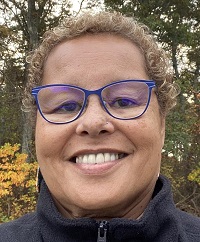Published in ConnectED Newsletter - Volume 5 - Issue 2 - June 2022
 Doctoral Lecturer Nancy Cardwell’s most recent publication, entitled “Thriving on Thin Air: A Black Woman’s Journey from Student to Faculty at CUNY,” will soon appear in The Children of the People: Writings by and about CUNY Students on Race and Social Justice (DIO Press). Edited by Rose M. Kim (Borough of Manhattan Community College), Grace M. Cho (College of Staten Island), and Rose McGinty (The Graduate Center, CUNY), the book revisits Horace Webster’s statement about the Free Academy’s experiment to question the outcome from the perspective of the students. It is divided into three sections: life, organizing and activism, and teaching and learning.
Doctoral Lecturer Nancy Cardwell’s most recent publication, entitled “Thriving on Thin Air: A Black Woman’s Journey from Student to Faculty at CUNY,” will soon appear in The Children of the People: Writings by and about CUNY Students on Race and Social Justice (DIO Press). Edited by Rose M. Kim (Borough of Manhattan Community College), Grace M. Cho (College of Staten Island), and Rose McGinty (The Graduate Center, CUNY), the book revisits Horace Webster’s statement about the Free Academy’s experiment to question the outcome from the perspective of the students. It is divided into three sections: life, organizing and activism, and teaching and learning.
In her chapter, Professor Cardwell (B.A., St. John’s University; M.S., Bank Street College of Education; Ed.M., Harvard University Graduate School of Education; Ph.D., The Graduate Center, CUNY) places her personal history as the great-granddaughter of enslaved Africans and the daughter of a CCNY School of Education alum in conversation with the broader history of the beginnings of higher education in the U.S. She also reflects on a series of interactions that offer insight on the barriers of access to the professoriate for people of color in general and Black women in particular. “Despite the struggles, losses, and barriers, there is something important in the CUNY mission that is worth fighting and sacrificing to achieve: renewing U.S. society through a fully funded CUNY to support educating the children of the whole people to sustain a vibrant, diverse democracy and public square.”
When asked about the importance of documenting the journey of a Black woman at CUNY, she said, “I think it is important to share my story …, adding my voice to the larger story of Black women in academe because our presence has been and remains fraught and scant. I situate my experience of being a student and faculty member at CUNY in the context of my history and early life. I also construct the broader historical context of higher education in the U.S. to note the significance of the promise of the founding of the Free Academy in 1847 despite its limitations.”
The words “thin air” in the title of Professor Cardwell’s chapter describe the enduring struggle to dream, imagine, and succeed in a context of sustained austerity. As she pointed out, she used them “as a layered metaphor to interrogate the impact of interlocking systems of austerity and structural racism on institutional culture, student education, and faculty experience.” She talked about being present and unseen as a Black woman faculty member in academe. “Although the experiences are mine, the assumptions of incapacity, lack of intellect, and marginalized status regardless of role are widely shared experiences among Black women in a range of higher education institutions. In order to survive, and hopefully thrive, I, like others, had to develop special capacities, funds of knowledge, and make tragic choices to successfully navigate the challenges.”
According to Professor Cardwell, schools of education have an important role to play in moving academe toward more inclusive and just pedagogical practices in higher education. “Faculties need to shift from focusing on the intent behind our practices and actions to focusing on the impact of our actions on others, examined through the prism of race. When we focus on our impact on others, we open authentic opportunities to learn each other’s perspectives and stories, which is essential for high quality education for culturally, linguistically, ethnically, and racially diverse students.”
Last Updated: 06/01/2022 15:26